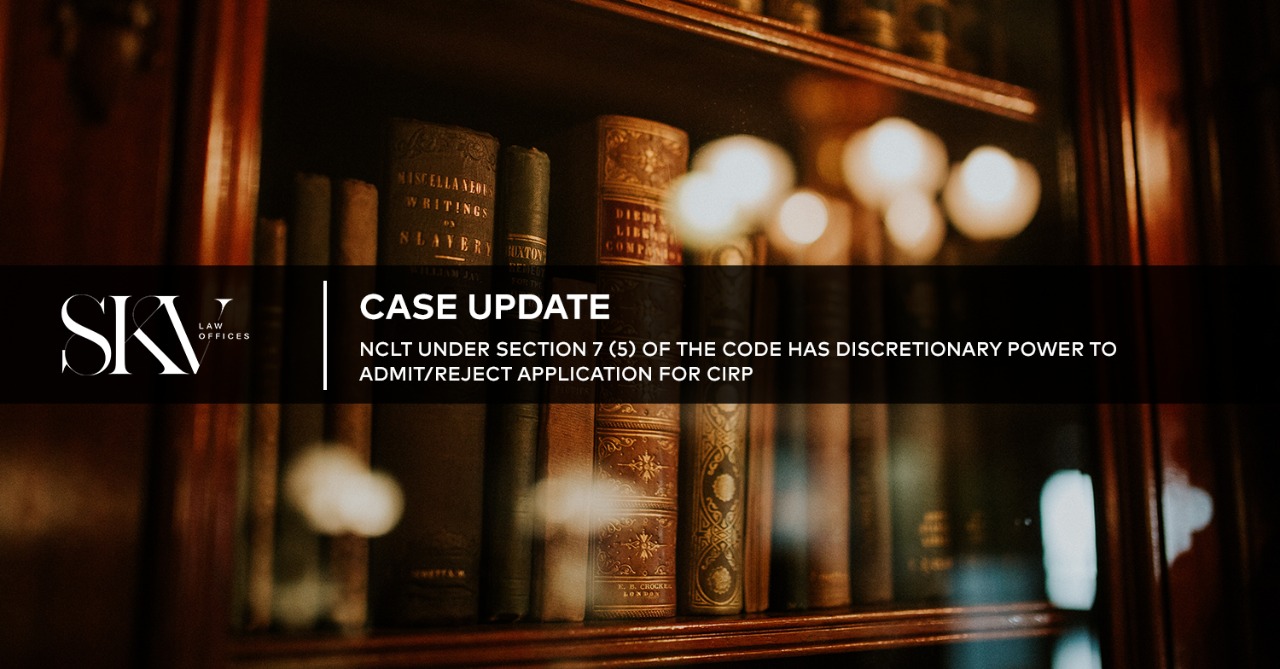NCLT UNDER SECTION 7 (5) OF THE CODE HAS DISCRETIONARY POWER TO ADMIT/REJECT APPLICATION FOR CIRP
14.07.2022
INTRODUCTION
On 12.07.2022, the Hon’ble Supreme Court, in a Civil Appeal filed by Vidarbha Industries Power Limited (“VIPL”) under Section 62 of Insolvency and Bankruptcy Code, 2016 (“the Code”) has held that the National Company Law Tribunal (“NCLT”) cannot arbitrarily and in a strait jacket manner admit Applications filed under Section 7 the Code as the legislative intent of Section 7 (5) (a) of the Code confers discretionary power on the NCLT to admit/reject an Application of a Financial Creditor under Section 7 of the Code basis the facts and circumstances of a given case.
SKV Law Offices (Shri Venkatesh, Managing Partner and Suhael Buttan, Senior Associate) represented VIPL in the present Civil Appeal.
FACTS
The Civil Appeal was filed by VIPL challenging the Order dated 02.03.2021 (“Impugned Order”) passed by the National Company Law Appellate Tribunal (“NCLAT”) whereby NCLAT refused to stay the proceedings arising out of Application filed by Axis Bank Limited (“Axis Bank”) before NCLT, Mumbai under Section 7 of Code during the pendency of the proceedings before the Hon’ble Supreme Court and the Maharashtra Electricity Regulatory Commission (“MERC”).
The primary contention raised by VIPL before the NCLT and NCLAT was that the only reason why VIPL has not been able to pay the dues of Axis Bank is because of an Appeal has been filed by the State Regulator, i.e. the Maharashtra Electricity Regulatory Commission (“MERC”) against Judgment dated 03.11.2016 passed by the Appellate Tribunal for Electricity (“APTEL”) in favour of VIPL has been pending before the Hon’ble Supreme Court as a result of which it has not been able to receive an amount to the tune of Rs. 1730 Crores.
RULING
While adjudicating upon the Civil Appeal filed by VIPL, the Hon’ble Supreme Court while deliberating upon the Question Law framed by VIPL that whether Section 7(5)(a) of the Code is a mandatory or a discretionary provision, held as follows:
- The Code has been enacted to facilitate the assessment of viability of an enterprise at a very early stage by ensuring a time bound CIRP and not penalise solvent companies who temporarily default in repayment of its financial debts.
- Both NCLT and NCLAT have fallen into grave error by holding that an application ought to be entertained under Section 7 (5) (a) of the Code once a debt has been established and that the Corporate Debtor has defaulted in making payments.
- Both NCLT and NCLAT were required to apply its mind to the relevant factors such as feasibility of the initiation of CIRP against an electricity generating company along with the impact of MERC’s Appeal pending before the Hon’ble Supreme Court and the overall financial health of VIPL due to such pendency.
- The legislature in its wisdom has chosen to use the expression ‘may’ in Section 7 (5) (a) of the Code whereas the expression ‘shall’ has been used for an Application under Section 9 (5) (a) of the Code. Therefore it is apparent that the Legislature intended Section 7 (5) (a) of the Code discretionary and Section 9 (5) (a) of the Code mandatory.
- The NCLT/NCLAT, while examining the facts and circumstances of the case have been conferred upon the discretionary power to either admit or reject the Application of a Financial Creditor under Section 7 (5) (a) of the Code. Therefore, when initiation of CIRP is resisted on the ground of existence of an award in favour of Corporate Debtor whose amount exceeds the debt, the Adjudicating Authority has to exercise discretion under Section 7 (5) (a) of the Code in abeyance.
Accordingly, the Hon’ble Supreme Court vide its Judgment set aside the Impugned Order and directed NCLT to reconsider the Application of VIPL for stay on further proceedings.
The Hon’ble Supreme Court has rightly held that with the expression ‘may’ in Section 7 (5) of the Code, the Adjudicating Authority can admit/reject the Application at its discretion. This ruling is not only a welcome Judgment for Companies that otherwise are solvent but have temporarily defaulted in repayment of its financial debts but it will also ensure Section 7 Applications are not admitted in a strait jacket manner and instead the facts and circumstances of each case are looked into by the Adjudicating Authority.”
SKV Comment
Link to access the Judgment: here.
Link to access the Order: here.


